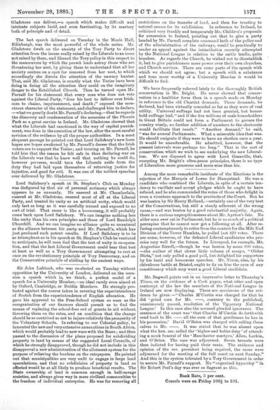The last speech delivered on Tuesday in the Music Hall,
Edinburgh, was the most powerful of the whole series. Mr. Gladstone dwelt on the anxiety of the Tory Party to divert attention from the issues really raised by the Liberals to an issue not raised by them, and likened the Tory policy in this respect to the mancetivres by which the peewit leads astray those who are threatening her nest, by giving them to understand that all her anxiety centres on a spot far removed from her nest, to which accordingly she directs the attention of the unwary hunter. That, said Mr. Gladstone, is exactly what the Tories have been doing in fixing all the attention they could on the imaginary danger to the Established Church. Then he turned upon Mr. Parnell for his statement that every man who does not vote against the Liberal Party, "does his best to deliver over Irish- men to chains, imprisonment, and death ;" exposed the mon- strous character of the statement, and challenged him to declare, —what we greatly doubt Mr. Parnell's declaring,—that he regards the discovery and condemnation of the assassins of the Phoenix Park as a great service to Ireland. Mr. Gladstone showed that what the Liberals had sanctioned in the way of capital punish- ment, was done in the execution of the law, after the most careful revision of the evidence by all the proper authorities. In a most eloquent passage he pointed out that Lord Salisbury's new-born hopes are hopes awakened by Mr. Parnell's decree that the Irish voters are to support the Tories ; and turning on Mr. Parnell, he told him that the reason he felt safe in thus declaring war on the Liberals was that he knew well that nothing he could do, however perverse, would turn the Liberals aside from the duty they had laid upon themselves of returning justice for injustice, and good for eviL It was one of the noblest speeches ever delivered by Mr. Gladstone.


































 Previous page
Previous page